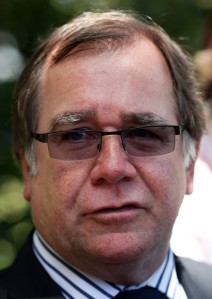
Aloysius Giyai
Being born into a very poor family in a remote village did not dampen Aloysius Giyai’s perseverance or determination to pursue a college education and build a successful career.
Five of Aloysius’ siblings died from malaria and cholera, leaving only Aloysius and two others, Damianus Giyai and Octovina Giyai. The deaths were partly due to the failures in Deiyai regency’s health service. The regency’s health services, as well as those in Paniai and Dogiyai regencies, were infamous for the high levels of malaria and cholera fatalities.
However, the husband of Agustina P. Katoar didn’t hesitate to recount his past.
“I reflect on my difficult and disadvantaged conditions as a child with appreciation because the experiences forged my strong personality and character,” said the 40-year-old dentist and master of public health.
His path in life, albeit marred by tragedy, led him to become a dentist and in 2009 he became director of Abepura Regional Hospital, Papua. Alo, as he is commonly called, attributes his success in part to a vow made by his father.
On Christmas Day in 1961, the Parish of Diyai village’s Catholic community had organized a party in the church yard to follow mass. All families were required to bring vegetables, cuscus meat, pork, sardines and instant noodles. Alo’s father, Giyaibo Raymondus Giyai, and his wife Yeimoumau Albertha Yeimo wanted their family to be involved with the event.
Giyaibo was confused with the demand for sardines and instant noodles because the family had never heard of them before; however, instead of giving up, he hunted and brought more than a dozen cuscus even though only two marsupials were needed. He also brought large quantities of vegetables and tubers.
Alo recalls the story of that Christmas day, when Giyaibo and his family left home at 5 a.m. and walked to church, which was 5 kilometers away.
After mass, the church committee examined the food brought by the families. When Giyaibo was asked where the sardines and noodles were, he remained silent until the church personnel showed him what they looked like.
“They are new to me. I didn’t know what to buy. So I brought more cuscus, vegetables and tubers,” he said, as told to Alo.
Giyaibo and his family were denied entry to the event and the children began to cry. Feeling deflated by the experience, they had no option but to walk home with their unwanted food.
When they got back to their owaa (home), they held a barapen (stone burning) family ritual, which was when Giyaibo, looking up at the sky, made a vow by the fireplace.
Before Ugatame (the creator), Giyaibo pledged that all his children would enjoy sardines and noodles and, through schooling, they would also observe and be engaged in the production of the luxury foods.
This episode, often retold to all of his children, instilled a determination into Giyaibo to send his kids to school at all costs, even though he and his wife were only small farmers living in a forest area.
“During our primary school years in Diyai, my father would be up before dawn preparing food for us to take to school. He taught us to observe discipline,” recalled the Airlangga University, Surabaya, East Java, master’s graduate.
Alo’s parents’ responsibilities were slightly relieved during his junior high school years because he attended a boarding school where he received spiritual guidance.
“They [the school] taught me the values of life, such as the feeling of gratitude. This strengthened my character,” said the recipient of 14 honors including The Best Executive Award from Citra Insani Foundation (2009) and Indonesia’s Most Popular 2012 from the International Human Resources Development Program Foundation.
“My dormitory life was highly beneficial,” he said, adding that if he had not stayed there, he would have had to face a 40 kilometer daily walk. Later, Alo progressed to Abepura State High School 1.
The school — a favorite of rich Papuans, officials and entrepreneurs — rarely accepted students from farmers’ families. As Alo was without the financial backing of a rich family to support his daily needs, he became a septic tank pump worker and gardener, draining nearly all the tanks in the Cenderawasih University housing complex.
As a dental medicine student at Airlangga University, he still faced financial difficulties despite a regional administration scholarship and help from relatives. So he sold dentistry instruments to fellow students.
“Thank God, my small business was doing well. What’s more, my peers as buyers came from rich families,” he said.
When he finally became a dentist and later a hospital director, he strived to improve the quality of life in his region, with the high mortality rate due to illness weighing heavy on his mind. So, during his service, he has bent the rules.
For instance, he has facilitated the treatment of poor families who lacked health social security network cards (JPS-BK) out of sympathy for the helpless patients.
“My conscience was challenged. I couldn’t let them suffer or even die. They could just show certificates from priests or customary elders. They shouldn’t face grave situations,” he stressed.
In fact, Alo was called to the Health Ministry in Jakarta to explain why he breaching the rules in the name of humanity.
“The ministry praised me. When I returned to Jayapura, [the late] governor J. P. Salossa also valued my work,” Alo added.
Source: The Jakarta Post




